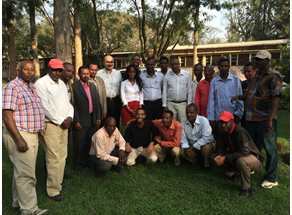* Batseba Seifu
Capacity building is a high priority in peace and security in Africa. E-learning has traditionally been for trainees who are urban and educated but don’t have time. However, a pilot e-learning course at the Institute for Peace and Security Studies (IPSS) has demonstrated that it can also be used to reach the grassroots community.
E-learning is gaining momentum in Africa. With busy schedules and limited attention, it is a great way of delivering training-particularly capacity building training. The pilot e-learning course at the Institute for Peace and Security Studies (IPSS) has strong lessons from which we can gain insight to design capacity building e-learning courses in Africa.

- Use gamefication in the acquisition of difficult knowledge and to transform attitude. In the conflict prevention and intervention training, we used photo stories, games, video dramas, animations, illustrations and the like. One of the trainees commented, the training “removed fear and built confidence in conflict resolution.” One trainee said, “He learned to not lose hope in resolving conflicts because the stories in the training showed him that there are several means of conflict resolution.” There was also increased knowledge of the benefit of and acceptance that women and youth should be part of community groups who work to resolve conflicts. Trainees also learned the mechanisms of customary institutions better. Further, trainees learned that bottom-up approaches are more effective than top-down approaches.
- Create groups and follow-up mechanisms to enable trainees to better use complex technology and increase participation. Using complex technology will enable digital literacy among trainees. On the other hand, trainees might have challenge in using such technology. In the pilot e-learning course at IPSS, we utilized tablet PCs. Despite common misconception, trainees were able to use this complex technology relatively easily. One positive practice that enabled us to overcome this challenge was assigning trainees who were more skilled at using tablet PCs the responsibility of assisting trainees who were less apt. Furthermore, telephone and face to face follow ups assisted in improving participation of trainees during the off-site training, and thoughtful completion and submission of assignments.

Group picture of pilot trainees and training organizers, 22 December 2014 to 16 January 2015. - Use Short Message Systems (SMS) but not tablet PCs as server for SMS application. SMS based interaction enabled reliance on telephone connection rather than the almost unavailable internet connection. However, use of tablet PC as a server caused several problems. The tablet PC that was used as a server had to be consistently checked and restarted. This was not possible as there were weekends in between. Therefore, although using SMS is a viable alternative to using internet for interaction, use alternate servers, for example short numbers used by Ethio Telecom.
Overall, the pilot training revealed that the training was successful and definitely useful and practical for trainees. We would like to thank our partners-Southern Nations, Nationalities, and People’s Regional State Security and Administration Bureau, Deutsche Gesellschaft für Internationale Zusammenarbeit (GIZ), Austrian Development Agency, and TAMESOL Communications!
*Batseba Seifu (batseba.s@ipss-addis.org) is an e-learning Project manager at the Institute for Peace and Security Studies (IPSS), Addis Ababa University. All views expressed in the AfSol blog are solely the views of the author and do not in any represent the views of IPSS or APSP. For more information on AfSol Blog please contact research@ipss-addis.org.

Reblogged this on IPSS Staff Blog and commented:
Reblogged from African Solutions in Peace and Security:
LikeLike
Interesting Initiative. Well done Batsebas
LikeLike
a needed and timely means of capacity building for those who were facing time limitation. well done IPSS and good job Batsebas!!!!
LikeLike
This is a great and innovative approach. Thanks for sharing!
LikeLike